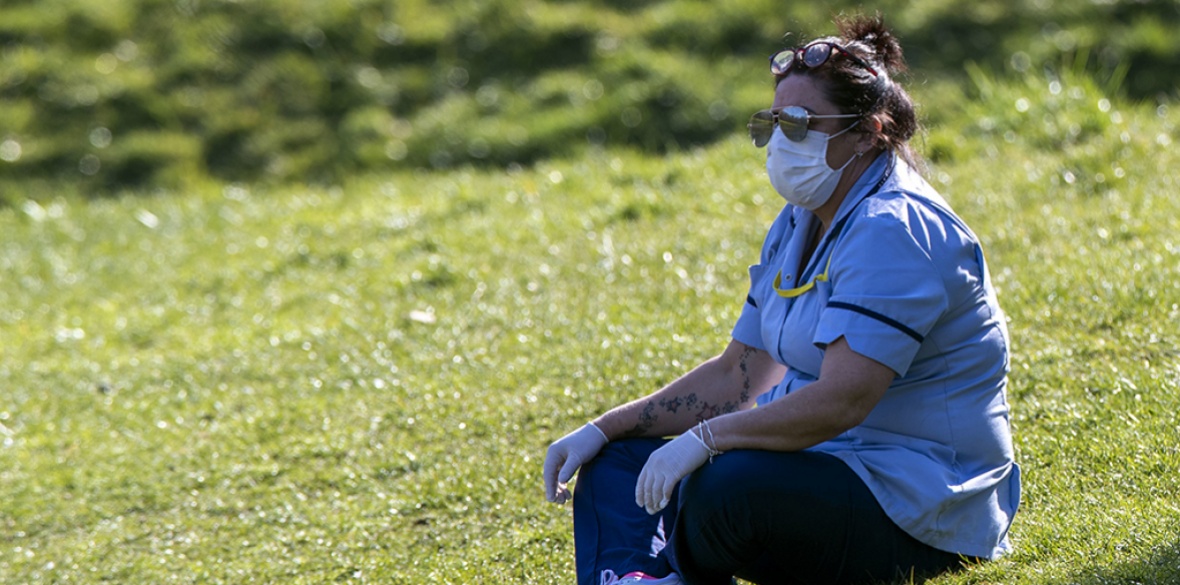This is the last article you can read this month
You can read more article this month
You can read more articles this month
Sorry your limit is up for this month
Reset on:
Please help support the Morning Star by subscribing here
SINCE becoming seriously disabled with spinal cord injuries, my heroes are the armies of care workers who visit my home and the homes of many other people who are frailer than me, the elderly and those suffering from conditions like dementia or Parkinson’s Disease.
This low-paid and often undervalued body of staff helps the NHS by keeping individuals at home.
They often don’t know what they are going to face when opening the door, from changing someone who is wet, who will require a shower and their bedclothes changing and washing, to feeding, giving medication and shopping for clients or taking decisions as to whether it is still safe for the individual to remain at home.
For example, it was only the quick thinking of a young carer who recognised I was shivering and my words were slurred, who by calling an ambulance meant the Sepsis was caught early and was able to be treated.
Care by its very nature is up close and very personal, with carers having no opportunities to distance themselves from Covid-19.
Take feeding someone for instance, the time and care it takes, yet many of these workers still don’t have any Personal Protective Equipment (PPE).
From the week beginning Sunday March 22, apart from one member of staff wearing far too loose latex gloves, no other carer had any protective gear. I offered them my own latex gloves that I use for my catheters, leaving me short of these essential items.
Not only are these carers having to put themselves and as a result their families at risk, but if they become infected then it is possible that a sizeable amount of these frail and vulnerable clients and families will also be at risk.
This lack of PPE is an insight into how home care workers are protected generally. These carers are helping the most vulnerable in society but despite hard, physical and emotionally challenging work, these members of staff are often either on the minimum wage or on lower than the minimum wage, when costs such as transport between jobs or uniforms are not covered by pay.
When we as a country recover, it is time these home care workers are put on a par with nurses and district nurses and as such receive accredited training and a salary to match their level of training and experience.
They are making life and death decisions every day and for that they should be recognised. Union representation and a body representing home care workers should be established, that will fight for home care worker members no matter how private or small their agency might be.
As we look at the conditions for home care workers it is only right and just that the care given by family members is also recognised and rewarded.
Quality training should be offered to them free of charge, to skill them up in areas which might be needed, such as dealing with medication or challenging behaviour as well as providing opportunities to meet other carers in the same position.
These family carers provide a service to our society as a whole, lessening the impact on the NHS, which is for the good of us all, so we must ensure that they not only have PPE for this period of time, but also long-term protection for their finances and emotional support.
Abuse can unfortunately happen to those who are vulnerable in whatever setting, but if staff are stressed through a lack of time, a lack of respect, a lack of decent pay and quality training, we are increasing the potential for such abuse.
Only by “care” being treated as a proper profession, requiring training and experience, do we lessen the likelihood of unsuitable people joining the profession, people taking up jobs they don’t intend to stay in for long or putting caring individuals in such tricky situations they snap.
The lack of PPE for home care workers reveals the lack of investment in them as members of staff and in the sector as a whole, both formal and informal. We should take the opportunity while we are in lockdown for Covid-19 to consider what a home care sector should look like in the 21st century as we try to meet the requirements of our changing population.
The Office for National Statistics (ONS) has projected that by 2031 the UK population will reach 70 million. Over the next 25 years the number over the age of 85 is set to almost double due to the post-war baby boom.
Alongside an ageing population we also know that many more people are now surviving longer with more challenging and complex conditions due to the advances in treatment from the NHS.
This means that no longer should home care workers be the unseen and less protected members of our social and NHS care, but be placed on a par with others in the NHS carrying out similar work, with union and other bodies able to represent this heroic body of staff.
Ruth F Hunt is a author and freelance journalist who belongs to the disabled community.











